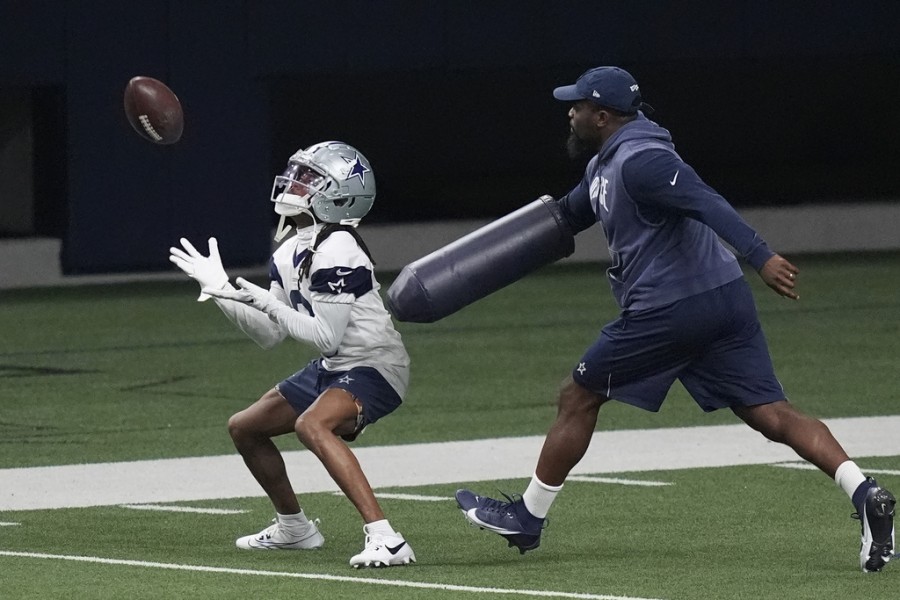FRISCO, Texas — The Kansas City Chiefs are considering the possibility of safety Justin Reid handling some kickoffs.
The Dallas Cowboys are hoping tiny return man KaVontae Turpin might finally break a big one two years after he basically made the team doing exactly that in the preseason.
Mostly, coaches and players in the NFL are wondering what they're getting into with radical changes to the kickoff rule.
It's no longer a “ dead, ceremonial play,” as league executive and former player Troy Vincent so flatly described it late last season, about three months before owners voted to change a rule that had been adopted in the name of safety, by reducing high-speed collisions.
The NFL is bringing the kickoff back to life, starting with teams investing time in offseason workouts — with plans for plenty more in training camps — into something that had become a pointless exercise.
“I haven’t (planned) training camp practices yet, but every day we’re going to be working either kickoff or kickoff return,” Chiefs special teams coordinator Dave Toub said. “You still have to work punt, punt return and everything. I don’t need more time. I just need to change the schedule a little bit.”
There's a lot to digest with changes that have their roots in the spring football leagues, with the NFL adding some of its own twists while wanting to ensure there wasn't an increase in injuries.
Here's an easy place to start: Most players can't move while the kick is in the air.
“I think everyone that sees it for the first time, it’s really strange because you see the kickoff and I’m standing right here and, it’s like you’re in space. You never see that happen without everyone moving,” San Francisco special teams coordinator Brian Schneider said.
“And so, it’s really like the music went off and everything, I was like in the ‘Twilight Zone’ and then when it happens, it’s just, it’s really fast.”
The standard kickoff is from the 35-yard line with the 10 coverage players lined up at the opposing 40. The return team has at least nine blockers lined up in a “set up zone” between their 30 and 35.
Two returners are inside the 20, and they're the only ones besides the kicker who can move until either they catch the ball or it hits the ground. That's when the coverage players and blockers converge.
The rule tries to build incentive for teams not to blast the ball into or beyond the end zone by moving touchbacks to the 30 from the 25.
The Chiefs would consider Reid for kickoffs on the theory that an extra tackler is needed, rather than a kicker with a usually slender build that would be considered a liability.
While it's likely traditional kick return guys — think diminutive, shifty and speedy — would still have a role, there is a question of whether prototypical running backs could be useful.
“There’s a lot of people speculating it’s going to be more like an offensive or defensive outside zone running play,” said Cowboys special teams coordinator John Fassel, one of the strong advocates for change. “I still feel like it’s a kickoff return play.”
Teams are adding players to their 90-man rosters for the offseason and training camp with the new kickoff rule in mind.
And there have been some wild suggestions, such as Pittsburgh running back Jaylen Warren saying on a teammate Cam Heyward's podcast that the Steelers were considering using newly acquired quarterback Justin Fields as a return man.
Fields pretty much shot down that idea, but the point is, a lot of personnel considerations will be in play.
It's worth noting that kicking teams are likely to work on bouncing the ball to the returners because it could give their coverage players a little bit of a head start before the returner gains possession.
“It’s all about the ball,” Schneider said. "So, is it going to be like a shortstop? What type of fielding balls are you going to get? And then what type of runners are there? Is it going to be better to have a bigger back where you can break through the arm tackles? Is it going to be a quicker guy?”
With touchbacks placed at the 25, about 22% of kickoffs were returned last season, Fassel said while adding the hope is to get that number above 50%.
As for Fassel's own guy, Turpin had just 10 kickoff returns in 2023, after 21 as a rookie. Turpin had the freedom to return any kick as long as it wasn't deeper than 6 yards into the end zone. It didn't help.
“I’m very hopeful with this new rule just because now, it’s going to be harder to kick it away from me,” said Turpin, who returned a punt and a kickoff for touchdowns in the same 2022 preseason game but doesn't have one in the regular season. “It’s a better opportunity.”
No matter what special teams coaches try in minicamps, training camps and preseason games, the effect of the new rule isn't like to take shape until the regular season. The rule is in place for this season and will be reviewed for 2025.
“There’s going to be a lot of chaos in the first four or five weeks of the season before everyone kind of gets a handle of what it is,” New York Jets coach Robert Saleh said. “I think you’re adding a game-changing element back to the game. So, it’s exciting to have it back in football.”
Not all coaches would choose “exciting.” But special teams ace C.J. Goodwin of the Cowboys would.
“It adds that excitement back to my livelihood,” Griffin said. “You can’t just walk away and go to the concession stands at this time. You’ve got to stay because anything can happen.”
At the very least, the new rule has teams thinking about kickoffs in practice again.

http://accesswdun.com/article/2024/6/1246118/radical-changes-bringing-nfl-kickoff-back-to-life
